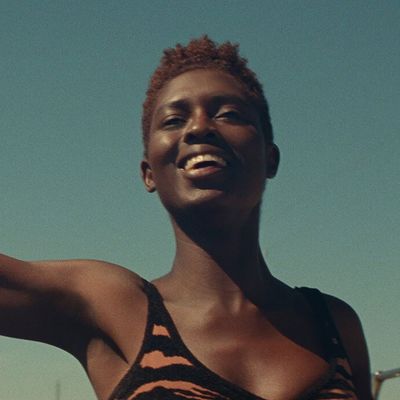
Queen & Slim, out this week, is full of indelible imagery. A dive bar dipped in cherry lighting. The colorful shotgun homes of New Orleans. Deep-brown skin drinking in light the color of cobalt and amber. From its visual virtuosity to its beguiling score by Devonté Hynes, this is a film bursting with style. But a film intent on exploring the layers of black love and black resistance in a world such as this can’t live on beauty alone. It needs soul, grit, and complexity — traits the script sorely lacks.
When Queen & Slim begins, it’s hard to imagine the love story that blooms afterward. Its two characters — played by British actors Daniel Kaluuya and Jodie Turner-Smith, who remain unnamed until a news story at the end of the film — are on an exceedingly awkward Tinder date. She scoffs at him praying before his meal at the black-owned diner where they meet. She’s curt. He’s trying to save face. When he’s pulled over by an overzealous white cop, things take a dramatic turn. She ends up shot in the leg and he kills the cop in self-defense, setting them on a journey from Ohio to New Orleans to South Florida, searching for freedom from the authorities nipping at their heels. As their prickly dynamic evolves into something more, Queen & Slim struggles with its form, landing somewhere between a moody visual poem and a plot-driven drama — never quite achieving either in its disjointed moments.
The film is at its best when making an argument to catch joy wherever you can find it. The characters inspire in each other a lovely recklessness to hang out car windows and feel the breeze, or sneak onto a farm to ride a horse. It’s here, in these brief scenes, when the film feels most urgent. It taps an intriguing vein of consideration: In a world and a country that is built on black suffering, is it not radical to find happiness wherever you can? The ecstatic beauty that Melina Matsoukas, an acclaimed music-video director in her first feature-length film, and cinematographer Tat Radcliffe bring to the film underscores the question. There is suppleness and texture bursting through the frame that is a wonder to behold in even small moments of conversation and long drives through the country. The costume design by Shiona Turini adds to the extravagance, lending the movie a heightened quality that borders on the surreal. He wears a cranberry velour tracksuit, she a zebra-print dress and snakeskin boots, both visions immediately memorable.
Turner-Smith and Kaluuya have an affable chemistry, but it never reaches the soul-stirring depths the film is reaching for. Bokeem Woodbine has a transfixing turn as her uncle, Earl, with whom she has a complicated relationship. But it’s Turner-Smith who truly captured my attention in the film with her lupine grace and magnetic presence. Unfortunately, she isn’t served well by a script brimming with clunky dialogue and a poorly sketched backstory that brings up more questions than answers.
As swaths of the country unfurl before the camera — verdant and aching — and the two characters continue to run from the law, becoming folk heroes in a narrative of resistance and police brutality in the process (the film name checks Assata Shakur as they make a plan to go to Cuba, putting them on a continuum of black radicalism), fissures in the script become apparent. Lena Waithe’s approach to these subjects is shallow and confused. That they’ve become heroes is apparent in the dash cam footage gone viral and the continuum of black folks who recognize them and decide to provide shelter. But these moments feel curiously weightless, largely because in the face of all its joy, the movie’s anger is never given the complexity it deserves. Most frustrating are two instances involving black cops we’re meant to understand as good people — as if to say it isn’t the system they’re willingly a part of that has issues, but individual white cops themselves. There’s also a poorly handled protest scene, confusingly intercut with shots of the two characters having sex for the first time.
There are the makings of a truly good film in Queen & Slim, one that handles its themes of resistance and joy with as much care and entanglement as its gorgeous stylings. Black anger can be beautiful and revolutionary. It has started movements, changed lives, and shown us more possibilities than we could have imagined. But Queen & Slim does a disservice to both the themes of love and anger by never giving the latter the depth it deserves, leaving the film a beautiful object to behold but a hollow narrative to consider.


